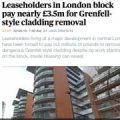
By Harry Scoffin
Labour heavyweight MP Hilary Benn has called for help to put pressure on government to honour its word that leaseholders would not be dumped with the costs of removing dangerous cladding from their apartment blocks.
Speaking at London City Hall on February 6, at a meeting organised by the Leasehold Knowledge Partnership and UKCAG, the MP for Leeds Central also urged leaseholders to get their MPs to attend his Westminster Hall debate on Wednesday at 2.30pm.
Mr Benn said that the £200 million ACM cladding remediation fund, announced last May to much fanfare by the then Communities Secretary James Brokenshire, was a reaction to the total failure of freeholders to “live up to their responsibilities” as custodians of the buildings they nominally own.
Third-party freeholders have no legal duty to pay for the maintenance of their properties.
The taxpayer bailout for private ACM-clad blocks was about “digging out of a hole the freeholders,” Mr Benn added.
He dismissed the government’s attempt to distinguish between Grenfell style ACM and other types of fire risks: “It doesn’t matter, from the leaseholders’ point of view, whether it’s ACM-clad, HPL-clad, other failures … or fire breaks that were never put in.”
Neither do the fire authorities make any distinction between Grenfell-style aluminium composite material, non-ACM combustibles and the other building issues that pose a material threat to human life, he continued.
“But the government seems to be diverging from that [professional] opinion,” one attendee called out.
“And that is exactly, Sir, the point I am making. I have just written to the chief fire officer of West Yorkshire [Fire & Rescue Service], who I met a week and a half ago, to try and see whether he is prepared to say that because it’s a binary choice for the fire service: either the building is safe, or it isn’t. If it’s unsafe and you have to have a waking watch, then what is the difference from the point of view of action that the government might be prepared to take?”
Drawing on past experience as a government minister, he said that officials “may be there and sitting thinking ‘crumbs’: if we take on responsibility for this unfolding disaster of an unyet unassessed scale, who knows what’s going to be found in more buildings when people start poking under the cladding and the brickwork and the timber”. But by extending the ACM fund the Treasury would be getting “safe homes and safe circumstances, which is a huge public benefit” and upholding the right to life, fulfilling one of the most basic roles of the state.

He criticised Communities Secretary Robert Jenrick for suggesting in the Commons last month that his department are in talks with the Treasury to provide hardship loans to leaseholders.
Leaseholders outraged as government weighs up loans rather than cash for buildings with dangerous cladding
Inside Housing, news, analysis, and comment about the social housing sector in the UK.
If this policy was to materialise, it would represent an abandonment of the position held by successive secretaries of state and ministers of state that ‘building owners’ should do the ‘decent thing’ and pay for post-Grenfell remediation works in the private sector and that it would be wrong for tenants to pay for these via the service charge.
Mr Benn suggested such a move would penalise leaseholders who have the misfortune of having dangerous combustible cladding which happens not to be the material used on Grenfell Tower.
He also raised concern that if loans were to be issued to building owners, in the same way the state is set to hand over taxpayer money to absentee freeholders, some offshore and unknowable, the policy could lead to profiteering and further misery for leaseholders:
“How do you guarantee that the freeholder isn’t going to pass the cost of servicing the loan and paying it back to you as leaseholders?”





 Getting Cayman Islands freeholders to help with cladding crisis is an additional difficulty, says UK’s top fire chief
Getting Cayman Islands freeholders to help with cladding crisis is an additional difficulty, says UK’s top fire chief






















This is a disgusting position for leaseholders to be left in through no fault of their own.
Leaseholders have no choice as to what type of cladding is put on their properties and this decision is often left to people that are not qualified to make these decisions in the first place.
The lease holders would already have had to pay for this dangerous cladding to be put on their properties. It is entirely down to the landlords. Further scrutiny of all future invoices to leaseholders should be mandatory to make sure any money is not hidden in the service charges in order the landlords try and recoup some of their losses.